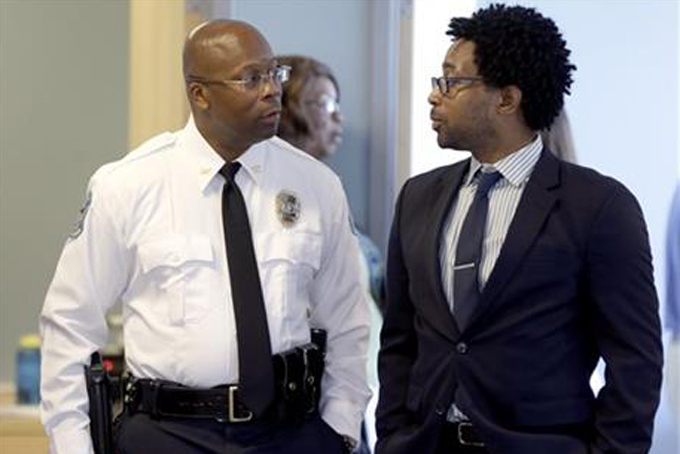
FERGUSON, Mo. (AP) _ Ferguson leaders introduced a new interim police chief Wednesday, tasking the Black police commander from Arizona with building trust between residents of the predominantly Black St. Louis suburb and its mostly White officers, nearly a year since Michael Brown’s death roiled racial tensions.
Andre Anderson, a 50-year-old with a quarter century in law enforcement, starts in Ferguson on Thursday, essentially on six-month loan from the Phoenix suburb of Glendale, Arizona. Anderson had an inside track for his new, albeit interim gig _ Ed Beasley, a Black man recently hired as Ferguson’s interim city manager _ had been Glendale’s city manager.
Touted for his knack for community outreach in policing, Anderson arrives in Ferguson as it is still working to get its law enforcement house in order after a scathing U.S. Department of Justice report in March pressed for reforms. That critique cited racial bias and profiling in policing as well as a profit-driven municipal court system that frequently targeted blacks, who make up about two-thirds of Ferguson’s populace.
Thomas Jackson, Ferguson’s police chief for five years, resigned just days after that report. His top commander _ Lt. Col. Al Eickhoff, hired by Ferguson just days after the Black, unarmed Brown was fatally shot last Aug. 9 by a white officer _ was named his interim replacement. Both Jackson and Eickhoff are White.
The Brown shooting touched off often-violent protests in Ferguson and a national “Black Lives Matter” movement seeking changes in how police deal with minorities.
Neither Anderson nor Ferguson Mayor James Knowles III, who is White, addressed specifics of the Justice Department report during a news conference Wednesday. But Anderson acknowledged that efforts to mend fractured relations between Ferguson residents and their police _ and improve the police force’s diversity _ may take more than the six months he has been granted a leave from his Arizona job.
Anderson pledged to foster within Ferguson’s department the “respect, cultural awareness and the professionalism this community deserves,” and he asked the populace to help him “set a course in the history books that clearly proves that peace prevails.” New officers, he said, should “reflect the demographics of the community.”
“I’m ready to roll up my sleeves and get to work,” said Anderson, a Philadelphia native, Army veteran and boxer who acknowledged that he hoped to be considered for the permanent chief’s position.
Several of Ferguson’s top officials _ Jackson, the city manager and the municipal judge among them _ resigned after the Justice Department report investigation initiated after the 18-year-old Brown was shot by Ferguson officer Darren Wilson. A St. Louis County grand jury last November declined to indict Wilson, who later resigned. The Justice Department also declined to prosecute Wilson, announcing that decision at the same time it released its report critical of police and court practices.
Knowles said Wednesday that in recent months Ferguson has adopted reforms, including hiring a new interim judge and revamping the municipal court system. He said Ferguson police were among the first in the St. Louis region to equip officers with body cameras in the wake of Brown’s death.
Ferguson administrators did not publicly detail financial terms of Anderson’s role as interim police chief. Jim Brown, Glendale’s human resources director, said through that city’s deputy clerk, Darcie McCracken, that Anderson will use vacation time during his six-month hiatus from Glendale before spending the remainder of that absence on unpaid leave through January of next year.
Glendale’s spokesman and interim city manager did not immediately return Associated Press messages Wednesday about the city’s rationale for letting Anderson serve as a fill-in administrator elsewhere.
Anderson was a police member of Glendale’s diversity committee in 2003 when he helped launch that city’s incarnation of “Unity Day,” a multicultural celebration he patterned after a similar festival dating to the late 1970s in his native Philadelphia. Glendale’s inaugural observance was “an opportunity for city officials to join with citizens and demonstrate Glendale’s commitment to promote peace, harmony and understanding among people from all walks of life,” according to a proclamation Anderson accepted at the time from Beasley.
___
Associated Press news researcher Rhonda Shafner in New York contributed to this report.